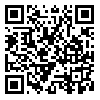Thu, Jan 29, 2026
[Archive]
Volume 2, Issue 2 (6-2023)
RHMS 2023, 2(2): 41-50 |
Back to browse issues page
Download citation:
BibTeX | RIS | EndNote | Medlars | ProCite | Reference Manager | RefWorks
Send citation to:



BibTeX | RIS | EndNote | Medlars | ProCite | Reference Manager | RefWorks
Send citation to:
Bakhshi M, Esmaeili A, Asadi F, Rajabi E, Hosseinzadeh M, Ahmadi Chenari H. Assessing the Relationship between the Role of Professional Identity and Spiritual Intelligence in the Level of Drug Addiction in Students of Birjand University of Medical Sciences. RHMS 2023; 2 (2) :41-50
URL: http://jrhms.thums.ac.ir/article-1-79-en.html
URL: http://jrhms.thums.ac.ir/article-1-79-en.html
Maryam Bakhshi 
 , Aliakbar Esmaeili
, Aliakbar Esmaeili 
 , Fariba Asadi
, Fariba Asadi 
 , Erfan Rajabi
, Erfan Rajabi 
 , Mohaddeseh Hosseinzadeh
, Mohaddeseh Hosseinzadeh 
 , Hadi Ahmadi Chenari
, Hadi Ahmadi Chenari 


 , Aliakbar Esmaeili
, Aliakbar Esmaeili 
 , Fariba Asadi
, Fariba Asadi 
 , Erfan Rajabi
, Erfan Rajabi 
 , Mohaddeseh Hosseinzadeh
, Mohaddeseh Hosseinzadeh 
 , Hadi Ahmadi Chenari
, Hadi Ahmadi Chenari 

Department of Nursing, Ferdows Faculty of Medical Sciences, Birjand University of Medical Sciences, Birjand, Iran; Hazrat Rasoul Hospital of Ferdows, Birjand University of Medical Sciences, Birjand, Iran , ahmadi.h@bums.ac.ir
Abstract: (644 Views)
The growing prevalence of drug use among university students presents a significant public health challenge, adversely affecting their academic performance, mental well-being, and professional roles. Professional identity and spiritual intelligence are key factors that may influence susceptibility to substance use. Investigating these constructs can provide valuable insights into the mechanisms behind drug addiction. Such insights are crucial for developing effective prevention strategies in academic environments. The purpose of this study was to investigate the correlation between professional identity,spiritual intelligence and the prevalence of drug addiction among students of Birjand University of Medical Sciences. The present study is a descriptive, analytical, correlational investigation. The statistical population included undergraduate medical students at Birjand University of Medical Sciences during the 2021-2022 academic year, with a sample size of 170 participants. After obtaining informed consent, participants completed the following measures: the King's Spiritual Intelligence Scale, the Jim Crossley Doctors' Professional Identity Questionnaire, and the Drug Orientation Questionnaire, along with a demographic information form. Data analysis was performed using SPSS software version 22, applying descriptive statistics (measure of central tendency and dispersion) as well as inferential statistical tests, including Spearman’s correlation, the Mann-Whitney U test, and Kruskal-Wallis test. The study revealed mean scores of 25.71±1.46 for professional identity, 36.09±6.62 for spiritual intelligence, and 39.71±3.66 for drug addiction. The results demonstrated no statistically significant correlation between spiritual intelligence and drug addiction (P<0.05). However, professional identity showed a significant negative correlation with drug addiction severity (P=0.02) with a correlation coefficient of -0.6. This inverse relationship indicates that higher level of professional identity are associated with lower degrees of drug addiction. These findings suggest that a strong professional identity among medical students reduce their susceptibility to drug use. Consequently, medical education curricula should prioritize on the development of professional identity. Although the study did not find a significant association between spiritual intelligence and drug addiction, the observed negative correlation highlights the potential value of incorporating spiritual intelligence development, particularly within medical ethics education, as a preventive strategy.
Subject:
General
Received: 2025/01/27 | Accepted: 2025/06/10 | Published: 2025/07/8
Received: 2025/01/27 | Accepted: 2025/06/10 | Published: 2025/07/8
Send email to the article author
| Rights and permissions | |
 | This work is licensed under a Creative Commons Attribution-NonCommercial 4.0 International License. |


